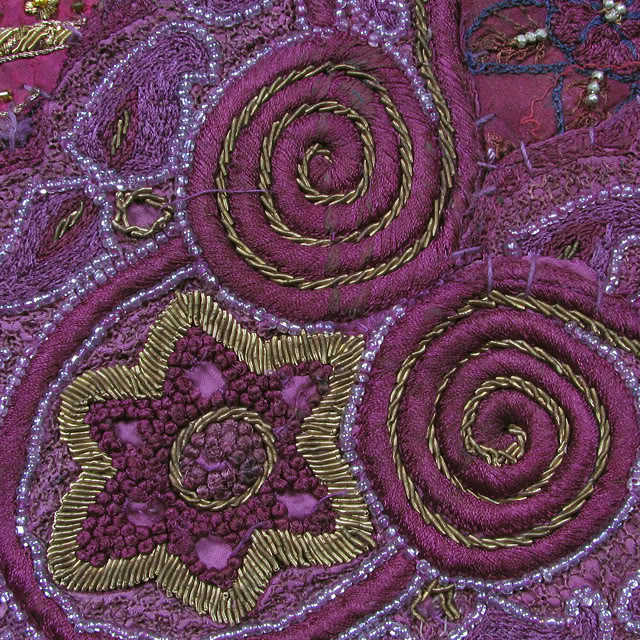===
0084,
4
===

=== |
 |
shorish : 'Commotion, confusion, tumult, disturbance, insurrection, &c.; —brackishness, saltness'. (Platts p.736)
kaifiyat : 'Quality, nature, character; mode, state, condition, circumstances; account, statement, remarks, report, particulars; relation, story, news; —exquisite state, flourishing state, enjoyableness, deliciousness, exquisite enjoyment; a sight to be seen, a beautiful view, &c.'. (Platts p.889)
maʿnī : 'Meaning, intended sense, intent, signification; indication, import, drift, acceptation; intrinsic quality; —spirituality; —substance, essence; reality; the interior or hidden part (of anything)'. (Platts p.1050)
saudā : 'The black bile (one of the four humours of the body), atrabilis; melancholy; hypochondria; frenzy, madness, insanity; love; desire, concupiscence; ambition'. (Platts p.695)
FWP:
SETS == POETRY
MOTIFS == MADNESS; NEIGHBORS
NAMES == REKHTAH; SAUDA
TERMS == MEANING; MEANING-CREATION; MOOD; THEME-CREATION; TUMULT; TUMULT-AROUSINGOn the spelling of the rhyme-word, see SRF's comments in {84,1}.
The verse is in the subjunctive-- why wouldn't Urdu poetry be in dire shape, if crazy Mir would be gone, and Sauda would be dysfunctional because he's a drunkard? The general sense of a vividly back-handed compliment to the poetic skills of Mir and Sauda emerges clearly, and the rest might well be wordplay. The three relevant words in the first line are technical literary terms (as SRF explains), and in addition they have a wide range of meanings and are also used more generally (see the definitions above), so that the possibilities remain wide open. And certainly the first line sets up a 'mushairah-verse' effect, since it asks a piquant but unanswerable question.
Then the second line answers that question in an enjoyably punchy way. SRF has pointed out the wordplay of gayā and rahā . There's also the name-wordplay, since Mir is a madman and one meaning of saudā is 'madness'. And above all there's the rhythmic internal rhyme at the quasi-caesura (since dīvānah is perfectly placed to rhyme-- and resonate-- with mastānah . In the ghazal world, madness and drunkenness provide some of the lover's most potent vantage points from which to view the cosmos.
But in worldly terms, a madman and a drunkard are a dubious pair. And since the speaker is someone else, someone who talks about both poets in the third person, who knows what tone he might be using? Possibly a censorious or at least patronizing tone ('It's a sad day for Urdu poetry that it has had to rely on untrustworthy, mad, dead, drunken reprobates like them-- and now has lost even them!')
Compare Ghalib's wry, self-ironizing evocation of a similar kind of patronizing bystander. This one too combines praise with criticism-- in ways that radiate outward beyond his control:
G{20,11}
MIR ON OTHER POETS: It's extremely rare for Mir to refer in verses to any of his contemporaries among Urdu poets; and of course he was so early that he hardly had many (North Indian) predecessors. Here's the only other notable such verse, from the first divan [{336,8}]:mīr-o-mirzā rafīʿ-o-ḳhvājah mīr
kitne ek yih javān hote haiñ[Mir and Mirza Rafi' [Sauda] and Khvajah Mir [Dard]--
how singular/unique/excellent these young men [habitually] are!]This is the only mention of Dard. Sauda obviously looms larger in Mir's imagination, for he gets one more mention, in the second divan [{592,7}]:
t̤araf honā mirā mushkil hai mīr is shiʿr ke fan meñ
yūhīñ saudā kabhū hotā hai so jāhil hai kyā jāne[to be beside me is difficult, Mir, in this art/craft of poetry
by happenstance there's sometimes Sauda-- well, he's ignorant, what would he know?]After this bit of friendly needling, no further such references to contemporaries occur anywhere in Mir's later divans. There are, however, a few references to Persian predecessors. The Persian poet Sa'ib (1601/2-1677) is mentioned in the first divan [{30,11}]:
shiʿr ṣāʾib kā munāsib hai hamārī or se
sāmne us ke paṛhe gar yih koʾī jā āshnā[the poetry of Sa'ib is suitable/congruent, from our side
if some friend would somewhere read something of his before me]In other words, Mir would listen to Sa'ib's poetry if the occasion arose, but apparently wouldn't actively seek it out.
This ghazal also includes an unusual closing-verse expressing grief at the early death of Mir's friend Taban (d.1749); Taban was a poet too, but appears here only as a friend [{30,13}]:
dāġh hai tābāñ ʿalaih ul-raḥmah kā chhātī pah mīr
ho nijāt us ko bichārā ham se bhī thā āshnā[there is a wound on my breast, Mir, for Taban, may God have mercy upon him
may he find salvation; the poor man was a friend even/also of ours]If Sa'ib is awarded a kind of back-handed compliment, Nizami receives a small, rivalrous touch of wordplay based on his famous 'Khamsah' [{580,3}]:
huʾī haiñ fikreñ pareshān mīr yāroñ kī
ḥavās-e ḳhamsah kare jamʿa so niz̤āmī hai[Mir, the friends' thoughts have become scattered/anxious
if their five senses would be collected/'khamsah', then-- it's Nizami]Finally, when it comes to the Persian-born Mughal court poet Naziri (c.1560-c.1613), in the first divan we find [{508,10}],
hai jī meñ ġhazal dar ġhazal ai t̤abʿa yih kahye
shāyad kih naz̤īrī ke bhī ʿahde se bar āve[in the inner-self there is ghazal upon ghazal-- oh Temperament, please say:
perhaps it would fulfill the position of even/also Naziri]And Naziri receives two more rather perfunctory mentions, late in the kulliyat. The first is [{1057,4}]:
kyā qadr hai reḳhte kī go maiñ
is fan meñ naz̤īrī kā badal thā[what respect does Rekhtah receive?-- although I
in this art/craft was the peer of Naziri]The second example, based on an obvious use of wordplay, from the sixth divan [{1897,8}]:
nah huʾe ham naz̤īrī se yūñ to
shiʿr ke fan meñ be-naz̤īr huʾe[we didn't become like Naziri, but well, somehow
in the craft/skill of poetry, we became peerless]But that's just about all the significant references there are. (I am not counting the vague wordplay with the name 'Shifa'i' in {435,1}; there's a similar wordplay with 'Ghani' in {1730,5}.) In his Urdu ghazals Mir simply doesn't go in that much for the kind of 'shout-outs' to other poets that were very common in the Persian tradition.